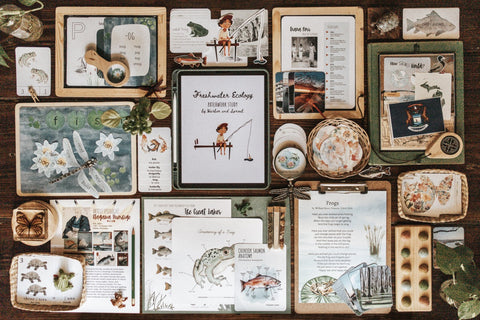
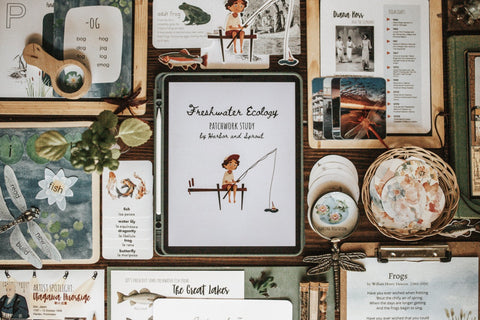
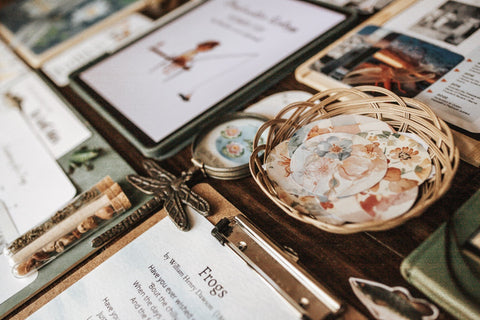
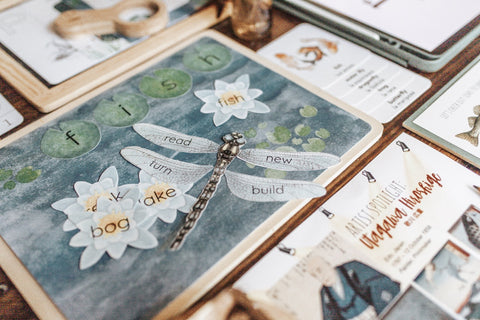
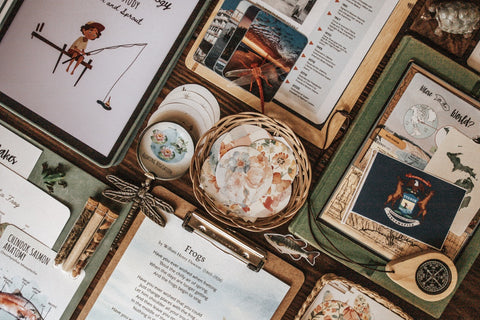
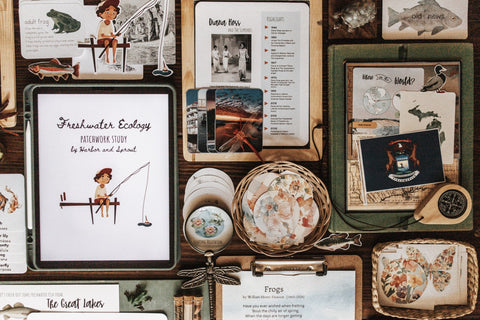
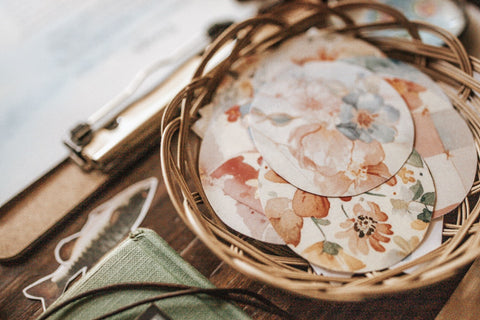
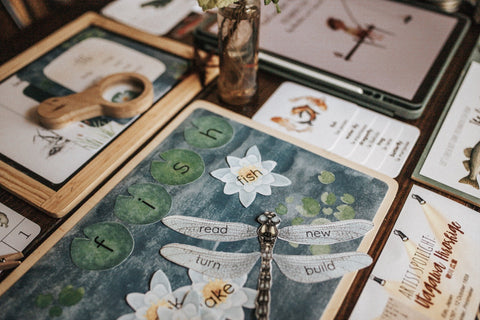
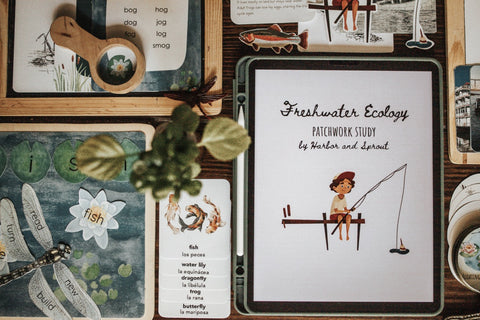
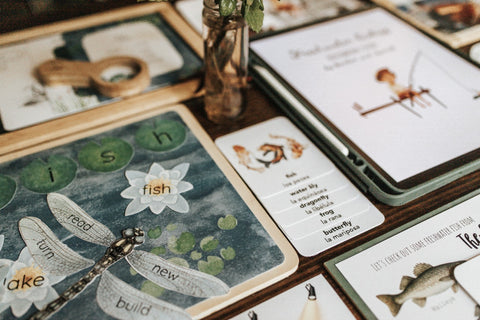
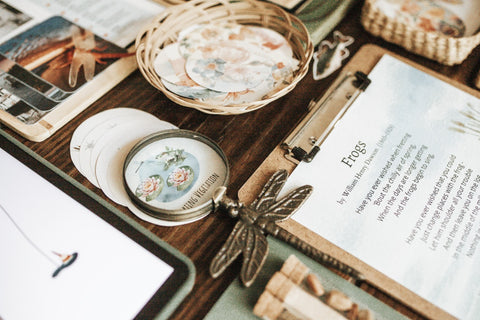
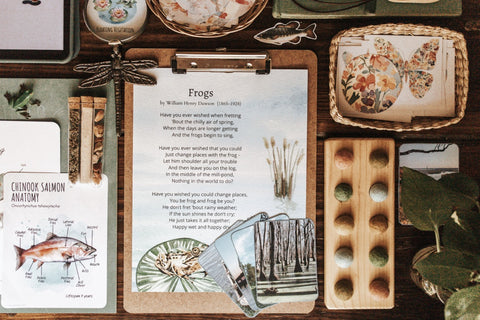
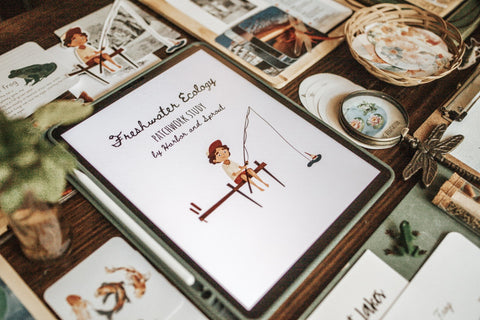
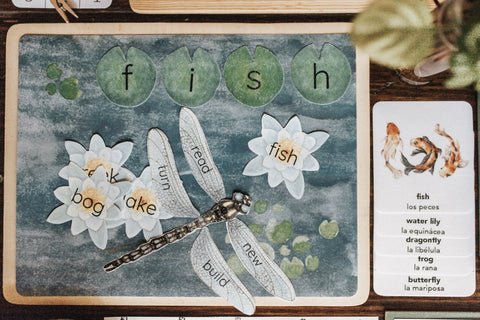
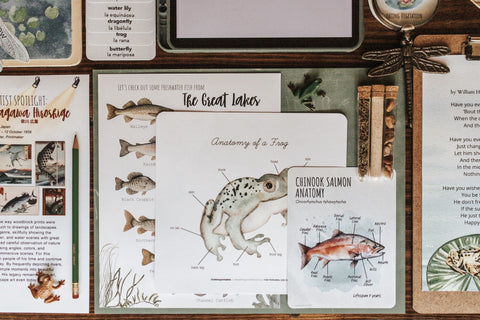
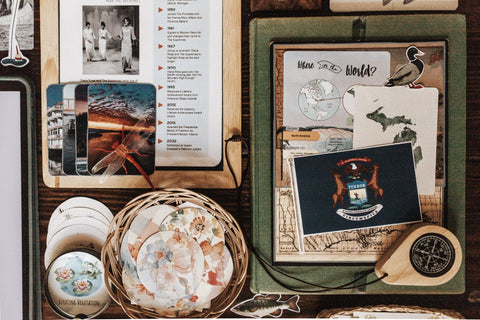
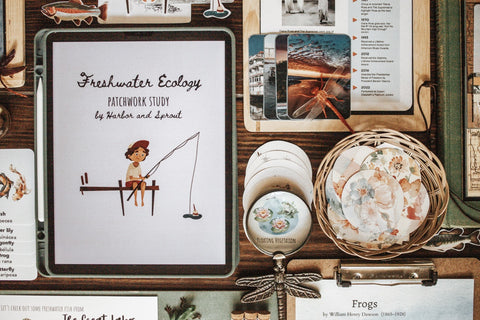
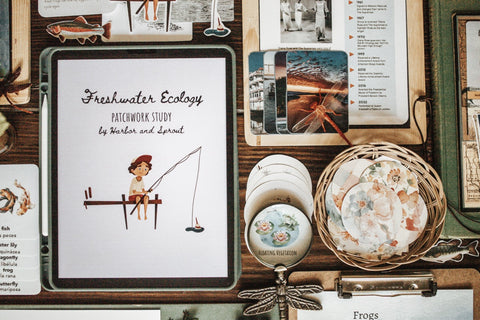
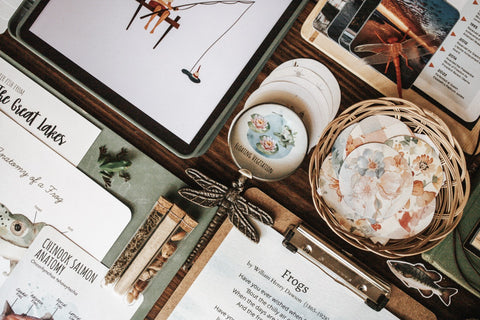
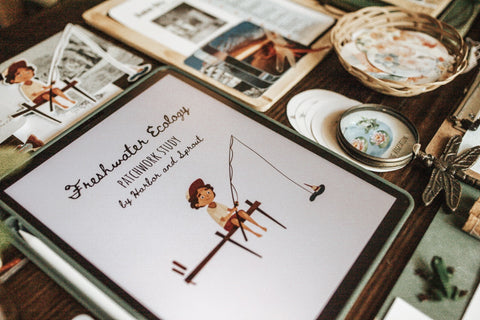
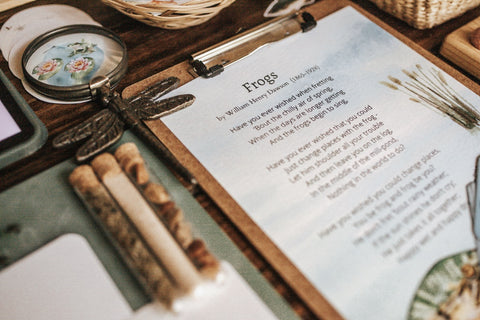
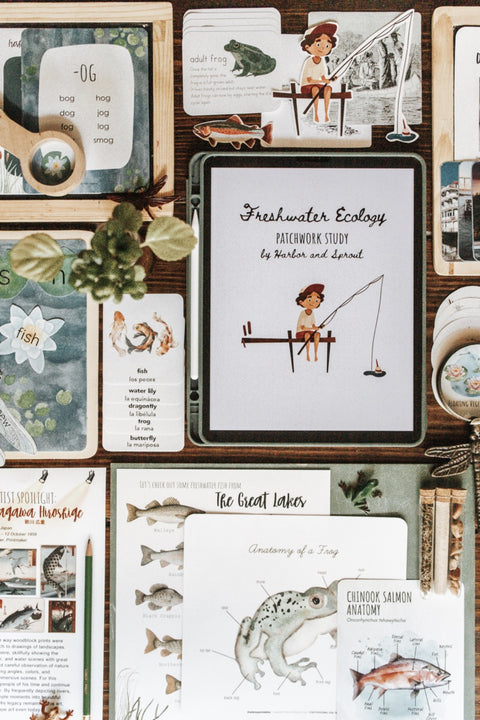
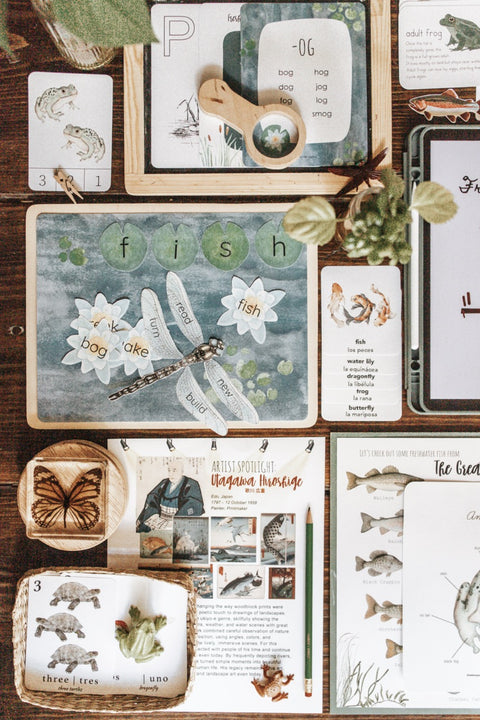
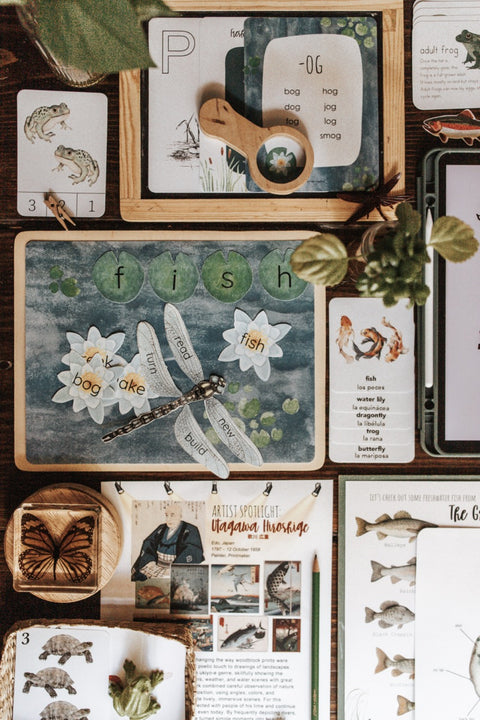
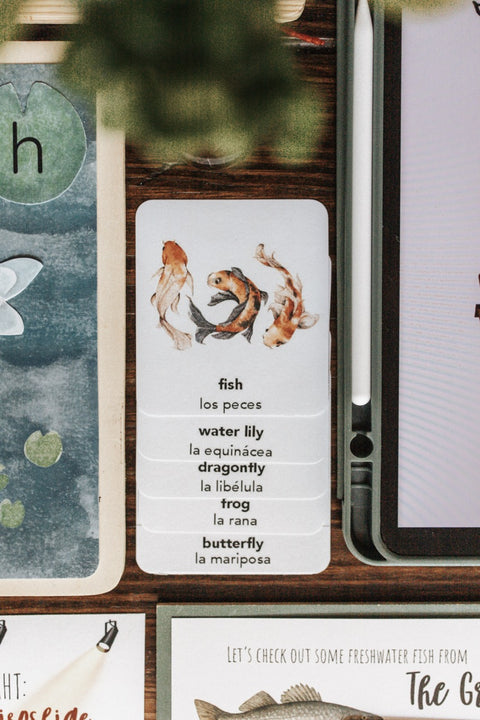
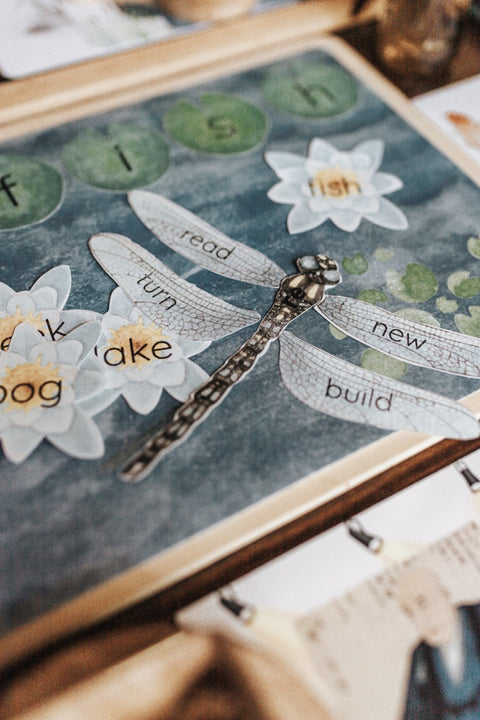
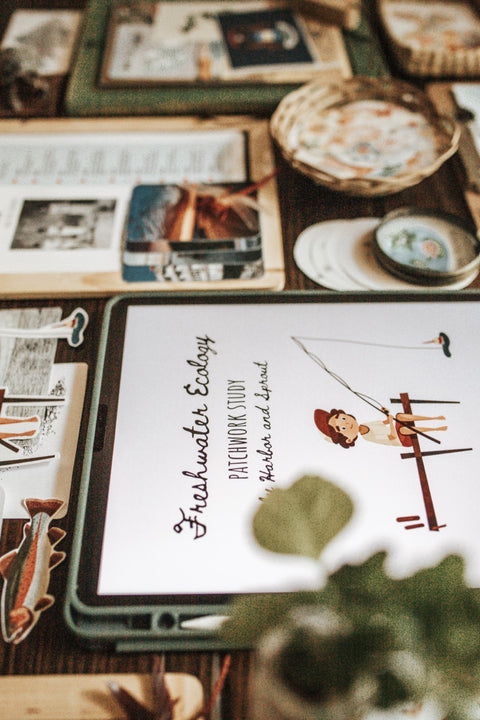
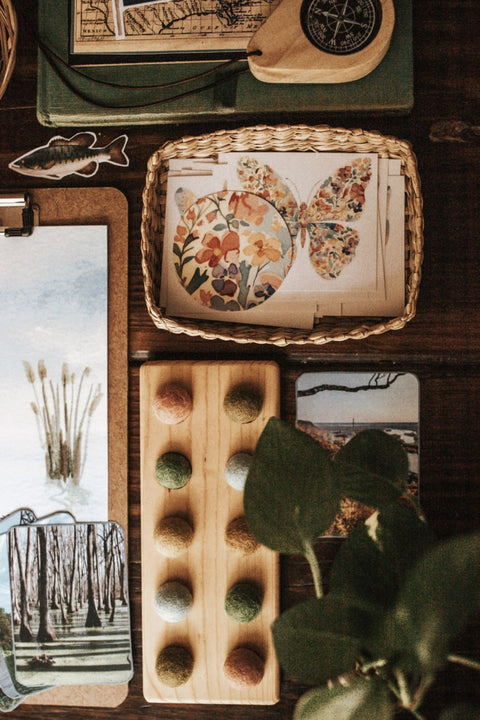
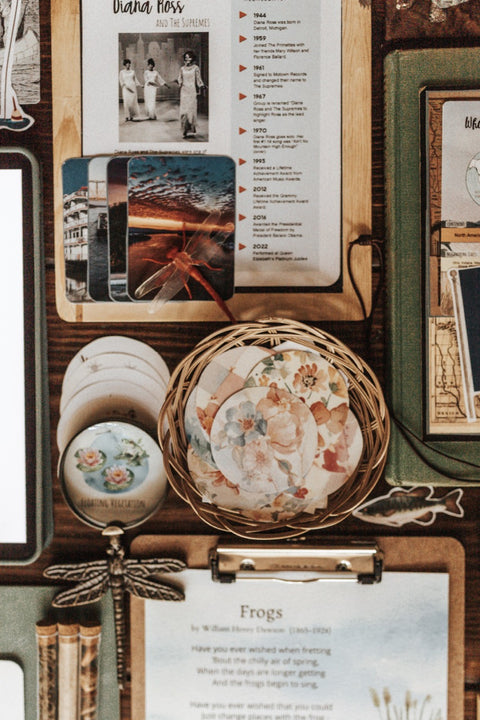
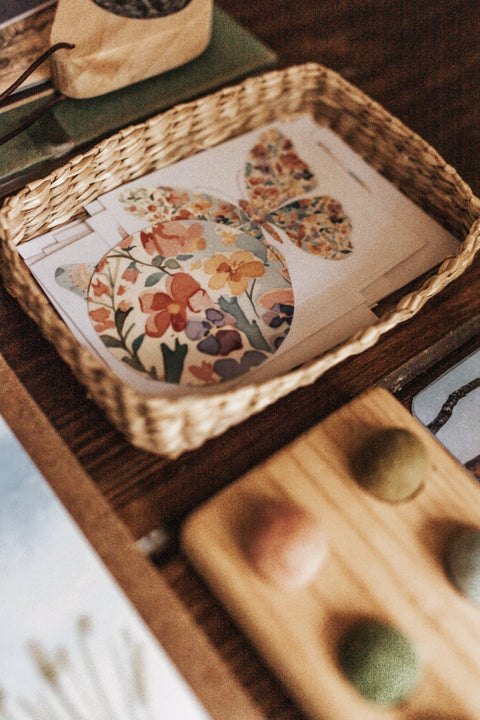
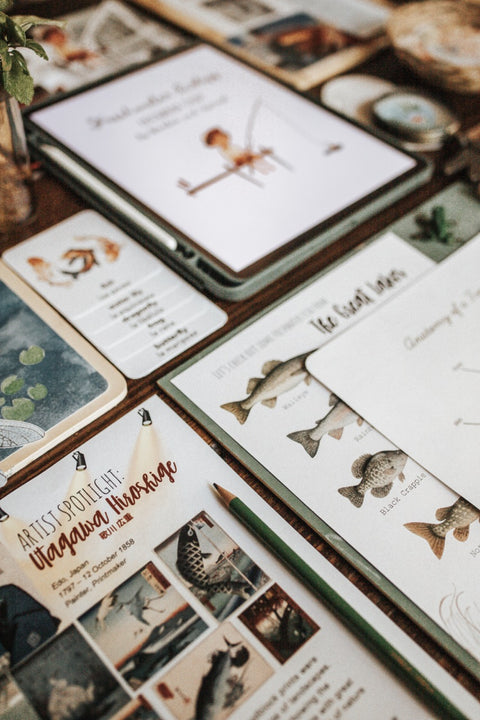
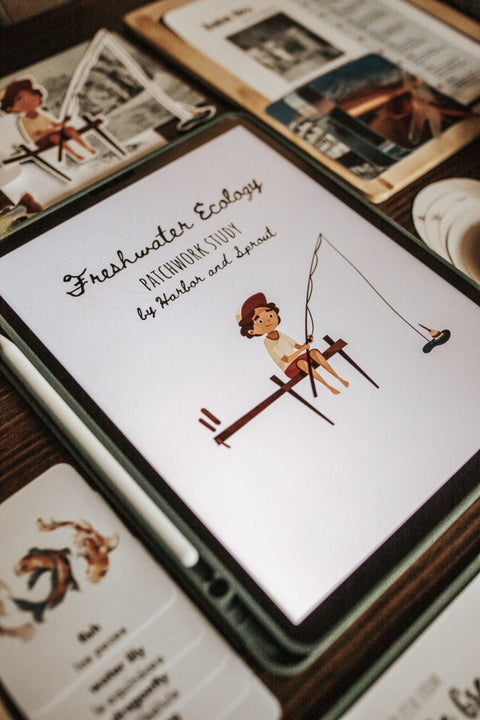
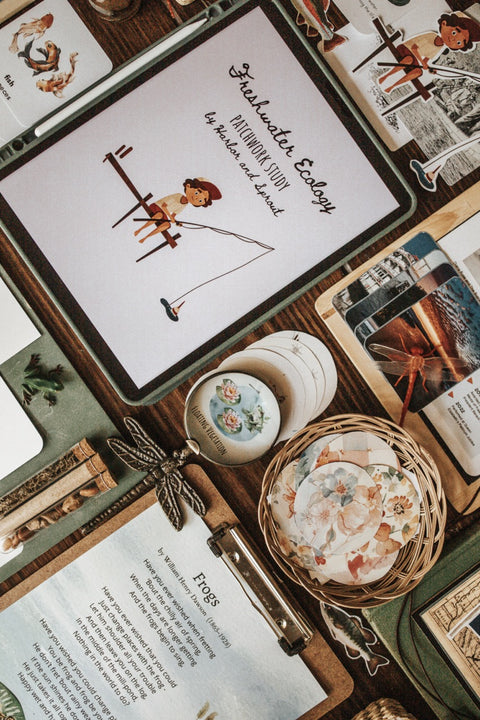
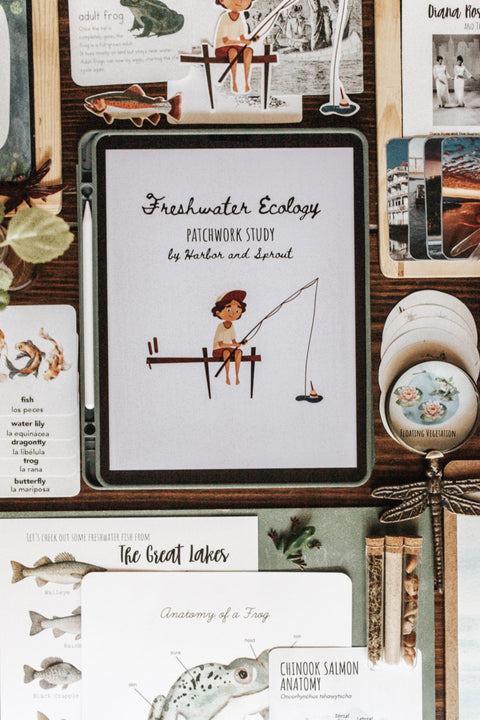
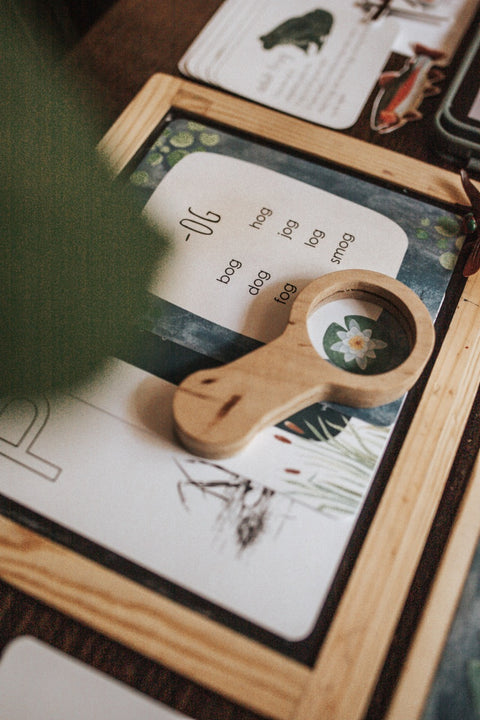
Harbor and Sprout
Freshwater Ecology Patchwork Study
Welcome to the Harbor + Sprout Freshwater Ecology Patchwork Study, the September 2025 release of our original elementary-level homeschool bundle-style unit study curriculum. This unit study features 4 weeks of lesson plans and materials covering all 9 of our core subjects and a playful supplemental section of thematic activities. This unit study is meant for use by children ages 3-12.
Click here to download a free sample of a Patchwork Study.
This unit is delivered via a secure link as a digital download.
CONTENT:
Handbook
Daily, weekly, and monthly planning pages
Book list including stories, poems, and field guides with recommended ages, subject correspondence, and brief summaries for each title
Scope and Sequence
Family read aloud with discussion guide and recipe
Character kit- new monthly character illustrated by Stephanie Groves to act as your guide through the unit
Science
Lesson 1: What is a Freshwater Habitat? In this lesson, you will explore freshwater ecosystems: the animals that live there and the unique plants that thrive there. You will label a cattail, build a food web, and compare biotic vs abiotic factors.
Lesson 2: What is a Wetland? In this lesson, you will dive deeper into wetlands, like marshes, swamps, and bogs. You will learn about wetland residents, like the great blue heron and the tiger salamander, and put the wetland’s ability to prevent erosion to the test.
Lesson 3: What is Life Like in a River? In this lesson, you will discover how rivers and streams are like the highways of freshwater ecosystems. You will learn about river residents, like dragonflies and salmon, and all the different parts of a river.
Lesson 4: What is Water Quality? In this lesson, you will consider why water quality is one of the most important parts of freshwater ecology. You will conduct a water stratification experiment, learn about the nitrogen cycle, and test water turbidity.
Nature Study
Lesson 1: What is a Pond? In this lesson, you will discover the natural and human forces that form and transform ponds, explore and create a mobile of the six pond succession stages, and begin your pond survey of a local pond in your area.
Lesson 2: Pond Plant Life- In this lesson, you will explore the relationship between different organisms in a pond ecosystem, discover the five types of producers in a pond, conduct a pond plant photosynthesis lab, and complete a photo challenge.
Lesson 3: Pond Animal Life- In this lesson, you will visit a pond in the spring and summer to see it come to life with a diversity of species, discover the role of pond animals, explore the ecological levels of classification, and design your own waterfowl.
Lesson 4: Pond Conservation- In this lesson, you will explore the factors that lead to algal blooms and their effect on pond habitats, discover how to become a pond protector, and learn all about how rainwater carries pollutants into ponds.
Language Arts
Lesson 1: Water Words- In this lesson, you will expand your freshwater ecological vocabulary, be able to define them, spell them, rearrange them, identify their parts of speech, use them in a sentence, and use them in creative writing practice.
Lesson 2: Old Pond- In this lesson, you will exercise your imagination to create a peaceful moment in nature. You will read a haiku called “Old Pond” by Japanese poet, Matsuo Bashō. Even though this poem is only a few words, it is powerful.
Lesson 3: Prefixes- In this lesson, you will learn all about prefixes, which are a small group of letters added to the beginning of a word to change its meaning. You will discover several common prefixes with their meanings and examples of each.
Lesson 4: Oxymoron- In this lesson, you will discover the wonderful world of oxymorons: what they are, how to use them, and examples of them. You will learn that writers and speakers use oxymorons to make their words more interesting or descriptive.
Writing
Lesson 1: Creating an Invention- In this lesson, you will begin your very own Invention Convention by first learning about others who invented everyday items. You will brainstorm problems to be solved and inventions to solve those very same problems.
Lesson 2: Designing Your Invention- In this lesson, you will continue the Invention Convention by taking time with the design process. You will consider different aspects of your invention design and allow your invention to come to life by sketching it out.
Lesson 3: Advertising- In this lesson, you will move on to the next step of the Invention Convention by focusing on advertising. You will decide what type of advertisement to use and the who, what, where, when, and why of the ad, then draw it out.
Lesson 4: Invention Research- In this lesson, you will finalize the Invention Convention by researching a famous inventor and invention. You will explore inventions you find interesting and then learn more about their very dedicated inventors.
History
Lesson 1: Historic Peoples of the Mississippi River- In this lesson, you will begin your study of Freshwater Ecology with a brief history of the science and its ecologists. You will explore the lives, culture, and history of the Native American peoples who resided around the river.
Lesson 2: Explorers of the Mississippi River- In this lesson, you will learn about several European explorers who arrived in North America and traveled along and across the Mississippi River. You will discover US history as it relates to the river and the surrounding lands.
Lesson 3: Tales of the Mississippi River- In this lesson, you will explore some of the many stories about the Mississippi River. You learn about some influential storytellers and the significance of birds to these storytellers, and then you will read an excerpt from Mark Twain.
Lesson 4: Traveling the Mississippi River- In this lesson, you will begin to discover the people and wildlife throughout history who traveled along this landmark river. You will dive a little deeper into steamboats, bridges, and the surrounding people and nature.
Geography
Lesson 1: Michigan, USA- In this lesson, you will explore the unique characteristics of Michigan, USA. You will learn various facts about the US state, the official and unofficial state song, and all about the surrounding Great Lakes.
Lesson 2: Maps- In this lesson, you will familiarize yourself with the North American continent and the state of Michigan. You will be able to locate many bodies of water and land masses on the world map and country map. See how many places you know.
Lesson 3: Michigan History and Culture- In this lesson, you will learn about the culture, history, cuisine, and music of Michigan. You will learn that the birthplace of the American automotive industry is Michigan, and then make a Michigan classic: the cherry hand pie.
Lesson 4: The Great Lakes- In this lesson, you will learn about a huge source of freshwater on our planet and its unique diversity of ecosystems. You will explore the water, wildlife, and wetlands that support thousands of plants and animals.
Music
Lesson 1: The Sounds of Water & Musical Articulation- In this lesson, you will explore music by listening to the sounds of nature, specifically the sound of water. You will learn what musical articulation means, names of the different types, and how they look on sheet music.
Lesson 2: The Deep End: Exploring Bass- In this lesson, you will learn the importance of bass in music and the different instruments that can provide bass sounds. You will listen to and compare music from The Temptations and an orchestra.
Lesson 3: The Motown Legacy- In this lesson, you will discover the history and social impact of Motown. You will learn all about who founded Motown music, how the sound is distinct, and the significance of the Funk Brothers and Diana Ross and the Supremes.
Lesson 4: Some Instruments in Motown Sound- In this lesson, you will continue your study of Motown music with a focus on the instruments. You will learn about the parts of a drum kit, the differences between a bass guitar and a regular guitar, and then listen to their sounds.
Art
Lesson 1: Fish- In this lesson, you will begin with an artist study of Utagawa Hiroshige, then you will create all your fish-centric masterpieces. You will create a one of a kind stamp, try your hand at screen printing, and learn the art of gyotaku.
Lesson 2: Amphibians and Reptiles- In this lesson, you will learn about the life and art of Osman Hamdi Bey. You will be inspired by our amphibian and reptile friends by sculpting a turtle, an axolotl, and a frog.
Lesson 3: Wildlife- In this lesson, you will learn about a painter who loved both beauty and nature, Abbott Handerson Thayer. You will create your own beauty of nature with a suncatcher dragonfly, a frog agamograph, and a paperbag beaver.
Lesson 4: Aquatic Life- In this lesson, you will learn about Mikulas Galanda, who combined traditional Slovakian folk styles with new European art to create his unique look. You will create your own style by coloring trout, shading a frog, and patterning a shrimp.
Math
Lesson 1: Lily Pad Patterns- In this activity, you will practice pattern making and recognition with these freshwater finds: lily pads and things you might find on them. You will be able to name the following patterns: AB, AAB, ABB, ABC, and AABB.
Lesson 2: Frog Leap Coordinates- In this activity, you will understand how to use coordinates and identify and plot coordinates on a graph. You will learn to read and plot on a Descartes’ coordinate plane in both positive and negative directions.
Lesson 3: Lily Pad Number Sequence- In this activity, you will practice your number sequencing 1 through 100. You will trace the numbers on these freshwater lily pads, and then you will identify and fill in the missing number on these beautiful water lilies.
Lesson 4: Butterfly Wing Matching- In this activity, you will use your sharp observation skills to compare patterns on butterflies. You will identify unique patterns that have been enlarged inside the circles and match them to the butterfly that has the same pattern.
Supplement
- Nature Activities
- Alphabet Letters: Pond Life
- Anatomy of a Frog
- Frog Puppet
- Frog Tracing
- Lacing Frogs
- Lifecycle of a Frog Number Clip
- Lifecycle of a Frog Cards
- Lifecycle of a Frog Poster and Activity
- Pond Numbers
- Supplemental and Bilingual Activities
- Bilingual 3-Part Cards in English and Spanish
- Spanish Puzzles
- Counting Cards in English and Spanish
- Word Search
This unit is delivered as a downloadable zip file. H+S Patchwork Studies average approximately 550-650 pages of content. While the download does include the option to print the full unit straight through front and back, we recommend printing on an as-needed, as-you-go basis. Enjoy your Freshwater Ecology adventures!
